5 Key Insights on Enterprise Search Software for Analysts

5 Key Insights on Enterprise Search Software for Analysts
Overview
This article provides key insights into enterprise search software, highlighting its significance in improving information retrieval and decision-making for analysts. The software's essential features include:
- Natural language processing
- Advanced data connectivity
- Analytics capabilities
These features not only enhance data accessibility and efficiency but also foster collaboration among teams. As a result, analysts are empowered to make informed decisions that drive strategic initiatives.
How can these capabilities transform your analysis processes? By understanding and leveraging these tools, organizations can significantly improve their operational effectiveness.
Introduction
In an age where information is both abundant and essential, organizations face the daunting challenge of efficiently navigating vast data landscapes. Enterprise search software emerges as a critical solution, enabling teams to swiftly access and utilize information from diverse internal resources. This article delves into the key insights surrounding enterprise search software, exploring its functionality, essential features, and the profound benefits it offers, particularly for market research analysts.
How can these tools transform the way organizations approach data retrieval and decision-making in an increasingly complex environment?
Define Enterprise Search Software
Enterprise search software includes applications designed to facilitate the acquisition of information from various internal resources within an organization. These resources include databases, document management systems, intranets, and other repositories. By providing a cohesive retrieval interface, enterprise search software enables users to quickly locate relevant information, thereby enhancing efficiency and improving decision-making processes. Typically, these applications employ sophisticated indexing, querying, and ranking algorithms to deliver accurate and timely results. This functionality establishes enterprise search software as essential for organizations that manage large volumes of information.
What features do these tools offer? They streamline the search process, allowing users to access critical data swiftly. The advantages are significant: organizations can reduce time spent searching for information, leading to more informed decisions and improved operational efficiency. Ultimately, the benefits of enterprise search software extend beyond mere convenience; it empowers teams to leverage data effectively, driving better outcomes and fostering a culture of informed decision-making. As organizations continue to navigate vast amounts of information, the role of enterprise retrieval tools becomes increasingly pivotal.
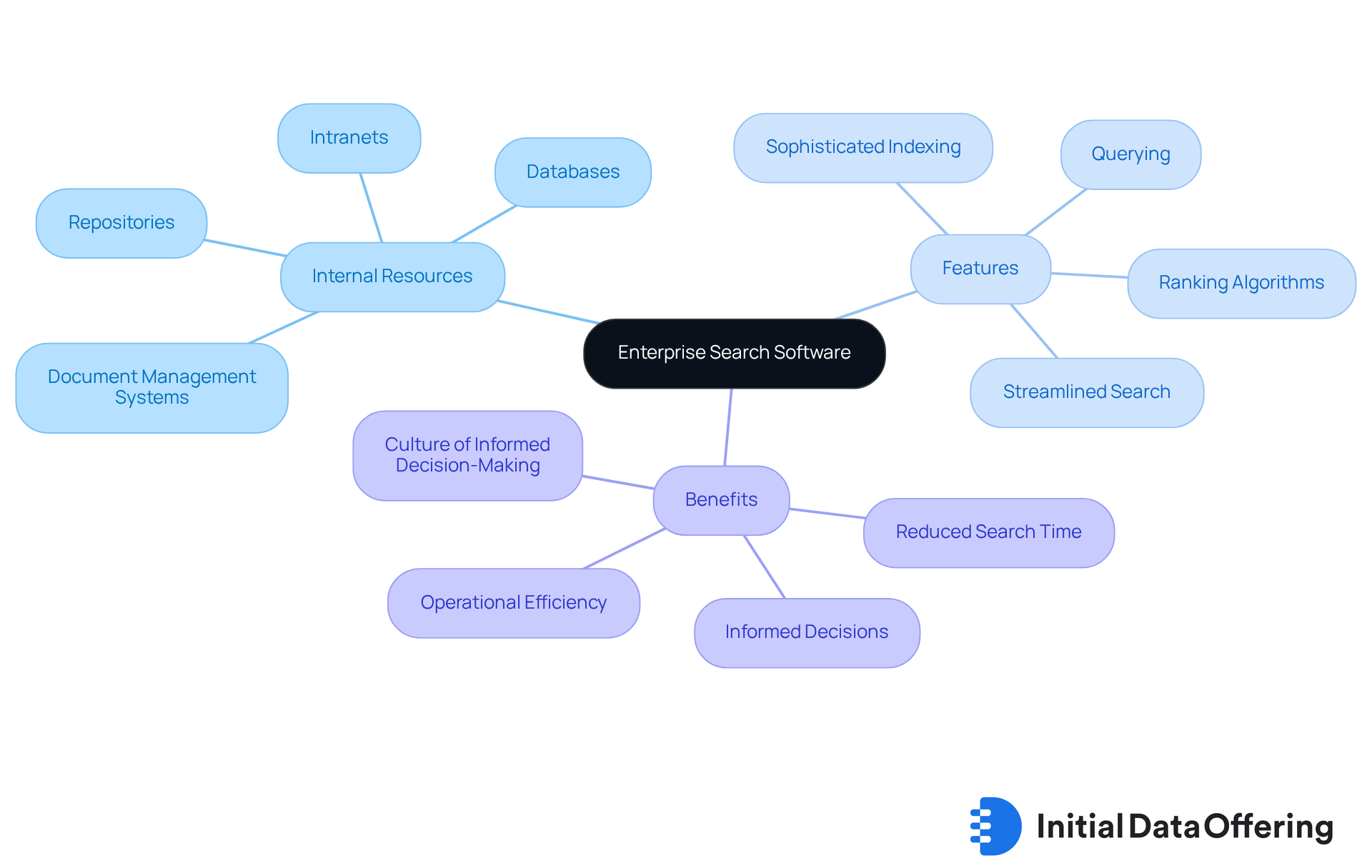
Explain How Enterprise Search Software Works
Enterprise search software plays a crucial role in indexing content from various information sources within an organization. This systematic process involves several key steps that enhance the functionality and effectiveness of the search applications.
- Crawling: The application begins by scanning and gathering information from diverse repositories, including databases, file systems, and cloud storage. This feature ensures comprehensive coverage of available data.
- Indexing: Once the data is collected, it is organized and indexed to facilitate rapid retrieval. This step involves extracting relevant metadata and keywords, which significantly enhances searchability, allowing users to find information more efficiently.
- Inquiry: Users can submit requests through a unified interface, which the application processes to identify pertinent results. This advantage streamlines the search experience, making it user-friendly and accessible.
- Ranking: The software then organizes results based on relevance, utilizing algorithms that consider factors such as keyword frequency, individual behavior, and contextual relevance. This ensures that the most relevant information is prioritized, enhancing the overall effectiveness of the search process.
- Presentation: Finally, the results are displayed in a structured manner, often with options for filtering and sorting to improve the user experience. This benefit guarantees that individuals can efficiently access the information they require, making enterprise search software an essential tool for organizations.
How can these features be leveraged to improve your organization's information retrieval processes? By understanding this systematic approach, you can enhance your operational efficiency and ensure that critical information is always at your fingertips.
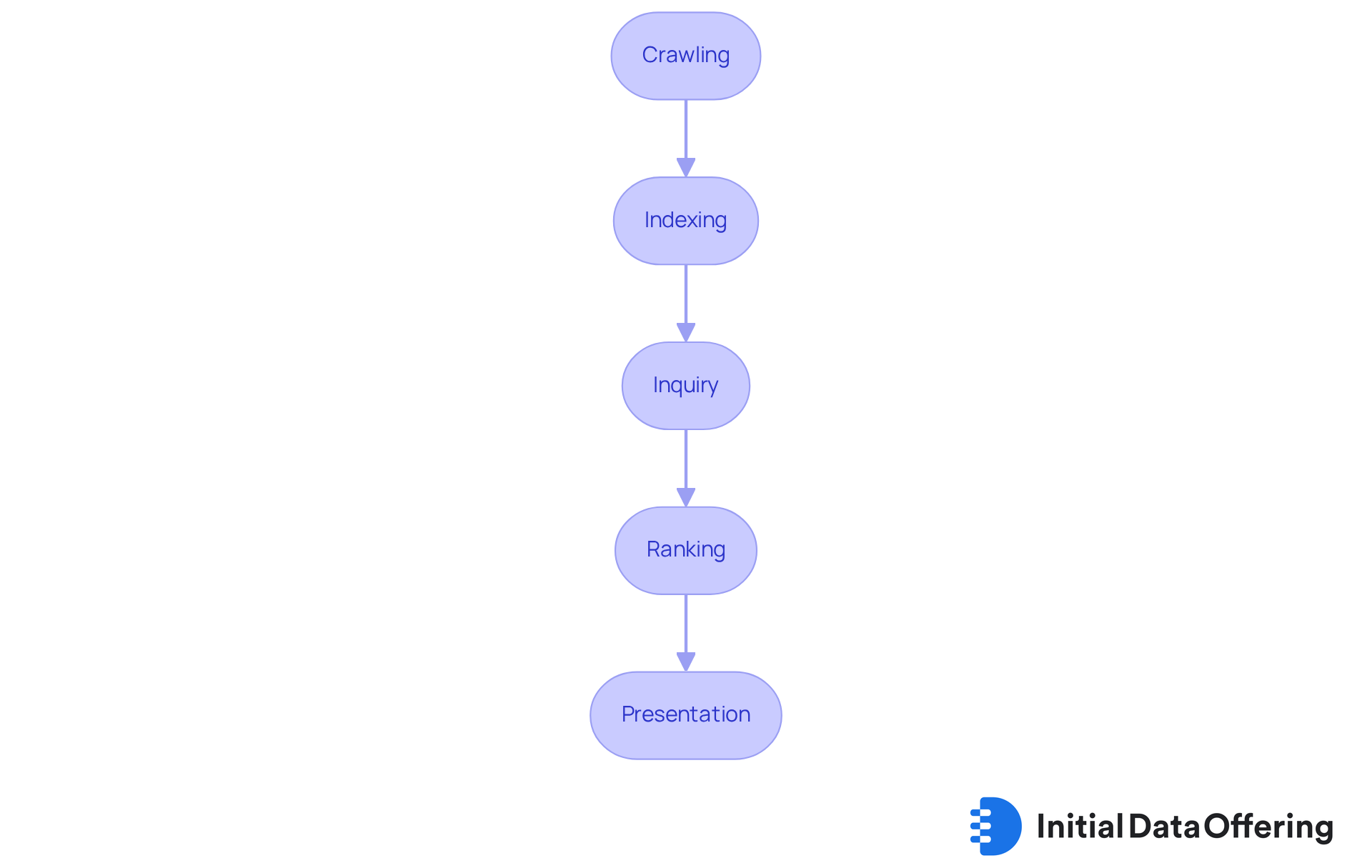
Identify Key Features of Leading Enterprise Search Solutions
Leading enterprise search software solutions offer a range of features designed to enhance usability and effectiveness. Natural Language Processing (NLP) is a key feature, enabling the software to comprehend and process user queries in natural language, which significantly improves search accuracy. This capability not only streamlines the search process in enterprise search software but also ensures users can find relevant information more efficiently.
Another important feature is Advanced Data Connectivity, which supports integration with various data sources. This integration allows for comprehensive access to information across the organization, ensuring that users can retrieve the data they need without obstacles. Such connectivity fosters a more informed decision-making process through the use of enterprise search software.
Furthermore, enterprise search software utilizes artificial intelligence to deliver tailored results and suggestions based on individual behavior. This personalization enhances user experience by providing relevant information quickly, ultimately leading to more effective outcomes.
Granular Security Controls are also vital, as they protect sensitive information through the implementation of access controls and permissions. This feature not only safeguards data but also instills confidence among users regarding the integrity of their information.
Additionally, the Analytics and Reporting feature provides insights into query performance and individual behavior. By analyzing this data, organizations can refine their optimization strategies, leading to improved retrieval effectiveness.
Lastly, a User-Friendly Interface is crucial for streamlining the inquiry process and boosting user engagement. A well-designed interface encourages users to interact more frequently with the system, leading to a more efficient exploration experience. Together, these features of enterprise search software contribute to a more effective and efficient retrieval process, ultimately enhancing organizational productivity.
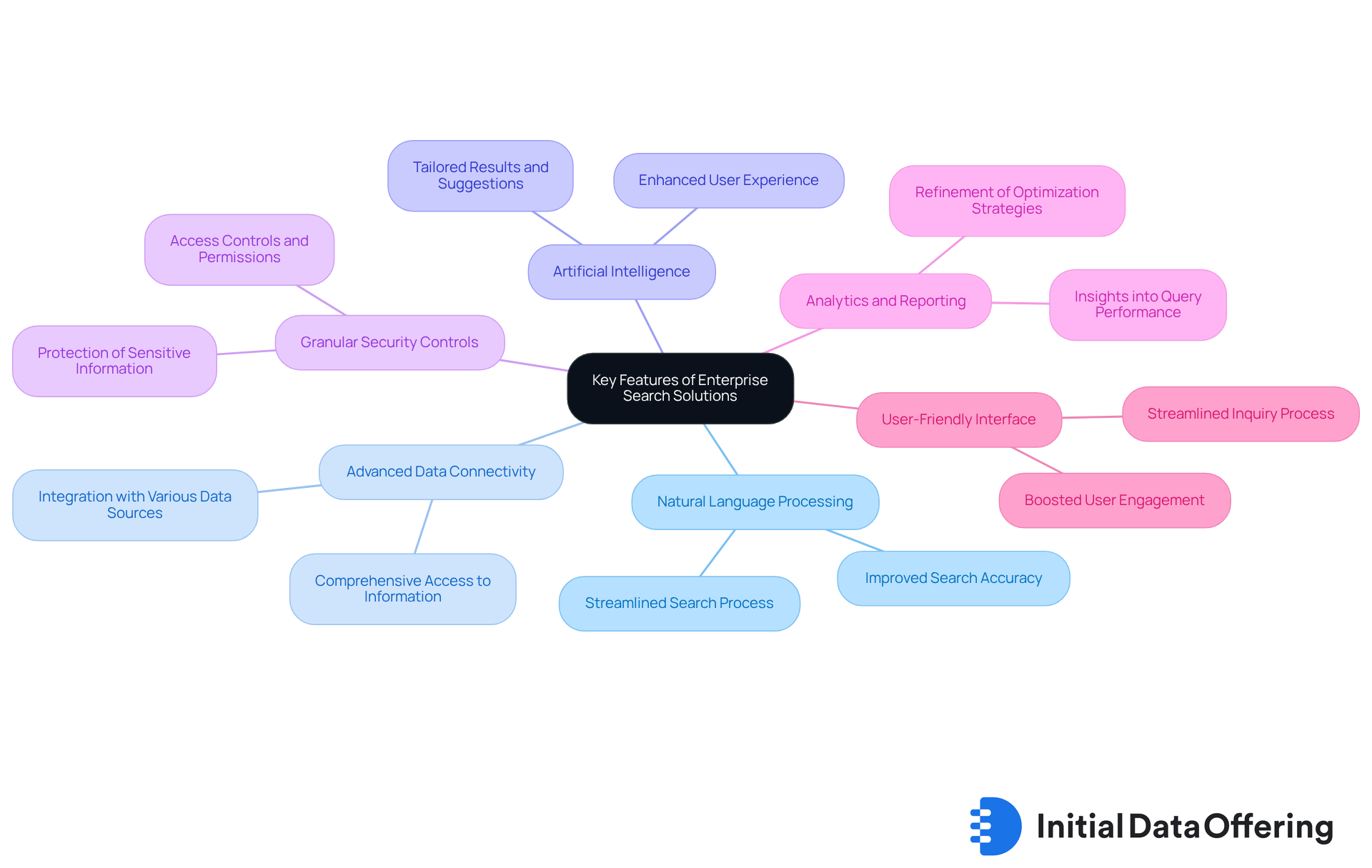
Evaluate Benefits for Market Research Analysts
For market research analysts, the advantages of enterprise search software significantly enhance research capabilities.
- Enhanced Data Accessibility: Analysts can swiftly access a diverse array of internal and external data sources. This capability facilitates comprehensive research, allowing for a more thorough understanding of the market landscape.
- Enhanced Efficiency: By reducing the time spent locating information, analysts can dedicate more focus to analysis and interpretation. This shift results in , ultimately driving better outcomes.
- Enhanced Collaboration: The application promotes knowledge sharing among team members, fostering joint research initiatives. Such collaboration leads to improved results, as diverse perspectives enhance the analytical process.
- Informed Decision-Making: With timely access to relevant data, analysts are positioned to make more informed recommendations and strategic decisions. This access is crucial in today’s fast-paced market environment.
- Trend Identification: The analytics features of enterprise search software empower analysts to recognize emerging trends and patterns. This capability significantly enhances their ability to predict market movements.
Overall, these benefits substantially improve the effectiveness of market research efforts, enabling analysts to deliver actionable insights and drive strategic initiatives.
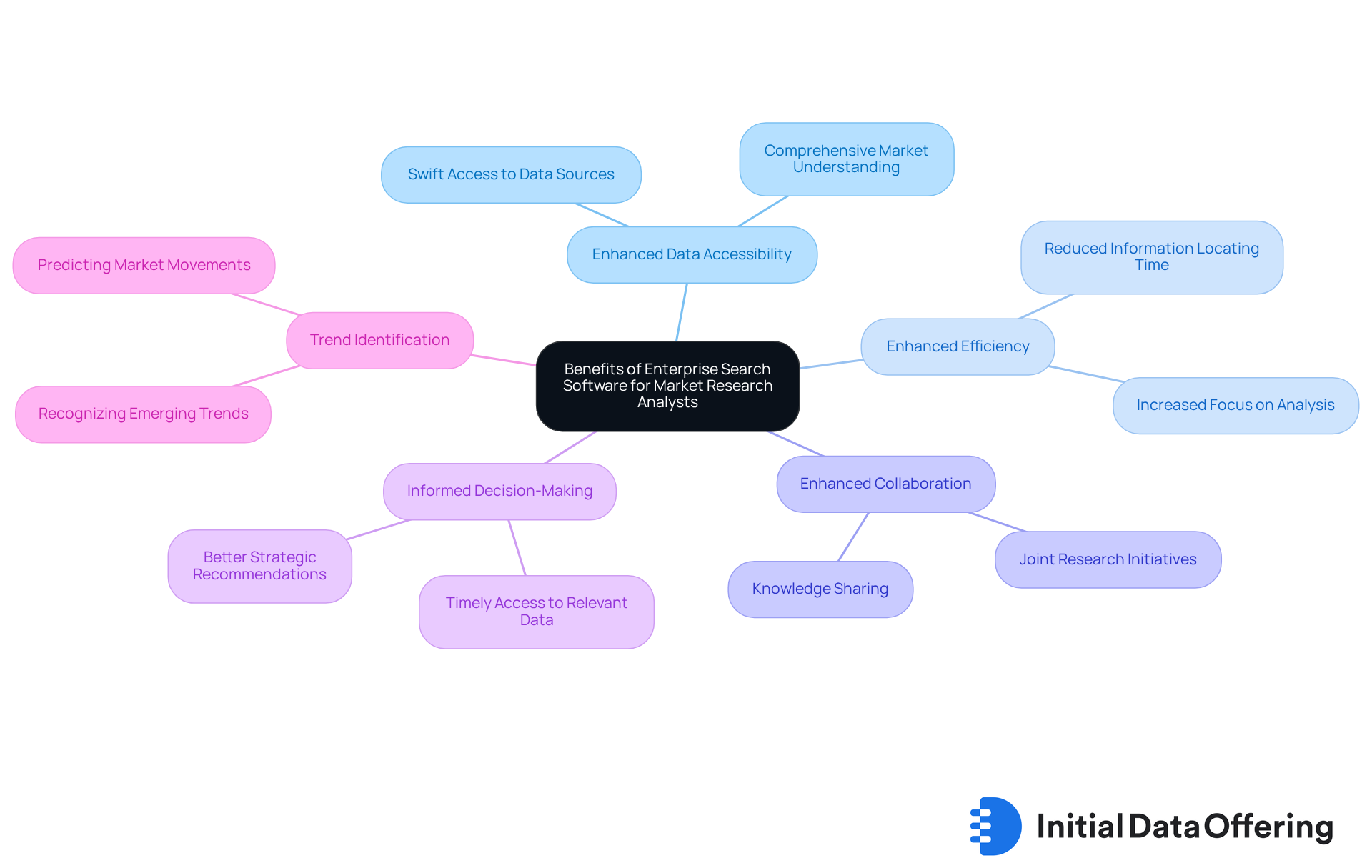
Compare Top Enterprise Search Solutions
When comparing leading enterprise search software, several factors come into play, including features, pricing, and user experience. Understanding these elements is crucial for organizations seeking the best fit for their needs. Here’s a comparison of three leading solutions:
- Coveo: Known for its AI-powered insights and robust analytics capabilities, Coveo excels in providing personalized search experiences. Its ability to integrate seamlessly with various information sources enhances its utility. Additionally, the advanced security features of the enterprise search software ensure that sensitive data remains protected, making this software a reliable choice for enterprises.
- Glean: Glean stands out for its user-friendly interface and natural language processing capabilities, which facilitate quick access to relevant information. This ease of use is complemented by strong collaboration tools that enhance team productivity, allowing users to work together efficiently and effectively.
- Lucidworks: This enterprise search software is recognized for its powerful data connectivity and advanced retrieval capabilities. Lucidworks provides extensive customization options, enabling organizations to tailor the search experience to their specific needs. Such flexibility is essential for adapting to diverse operational requirements.
In summary, while Coveo focuses on AI-driven insights, Glean emphasizes user experience, and Lucidworks offers robust customization, each solution possesses unique strengths that cater to different organizational requirements. Which of these features aligns best with your organization’s goals?
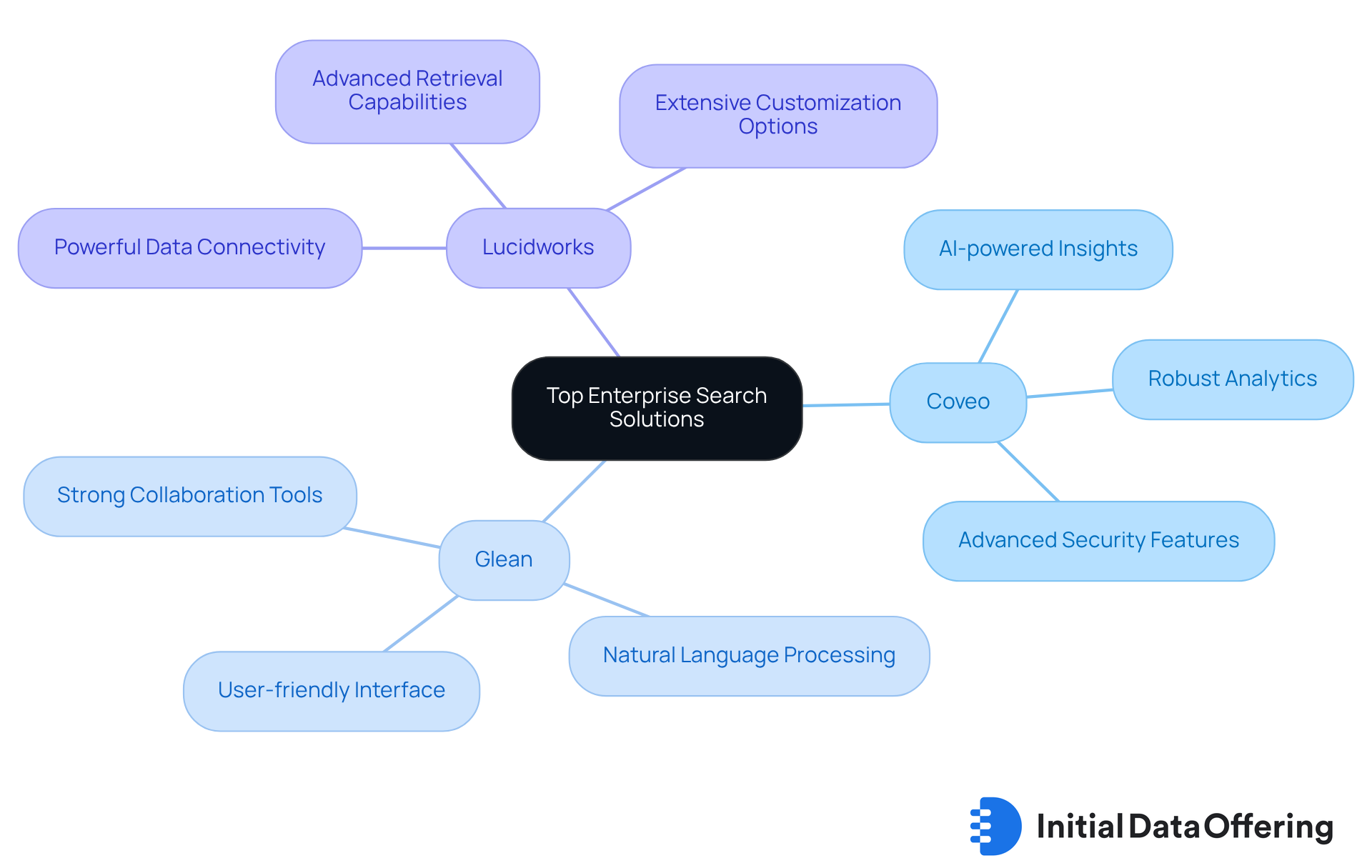
Conclusion
Enterprise search software serves as an essential tool for organizations striving to optimize information retrieval and improve decision-making processes. By unifying various internal data sources into a single, cohesive interface, these solutions enable users to quickly and efficiently access critical information. This capability ultimately nurtures a culture of informed decision-making within the organization.
The article explores the functionalities of enterprise search software, emphasizing key features such as:
- Natural language processing
- Advanced data connectivity
- Robust security controls
These components work together to enhance user experience and operational efficiency, facilitating rapid access to relevant data and promoting collaboration among teams. The advantages for market research analysts are particularly noteworthy; these tools significantly enhance data accessibility and efficiency, as well as the ability to discern trends—factors that are vital for making informed recommendations in a competitive landscape.
In an era increasingly influenced by data, the significance of effective enterprise search solutions is paramount. Organizations should evaluate their specific needs and consider the unique strengths of leading software options like Coveo, Glean, and Lucidworks. By harnessing the right enterprise search software, businesses can fully unlock their data's potential, leading to improved outcomes and sustaining a competitive advantage in their respective markets.
Frequently Asked Questions
What is enterprise search software?
Enterprise search software consists of applications designed to help organizations acquire information from various internal resources, such as databases, document management systems, and intranets. It provides a cohesive retrieval interface that enables users to quickly locate relevant information, enhancing efficiency and decision-making.
What features do enterprise search tools offer?
Enterprise search tools streamline the search process, allowing users to swiftly access critical data. They help reduce the time spent searching for information, leading to more informed decisions and improved operational efficiency.
How does enterprise search software work?
Enterprise search software works through several key steps: 1. Crawling - it scans and gathers information from various repositories. 2. Indexing - the collected data is organized and indexed for rapid retrieval. 3. Inquiry - users submit requests through a unified interface to find pertinent results. 4. Ranking - results are organized based on relevance using algorithms. 5. Presentation - results are displayed in a structured manner with filtering and sorting options.
What are the benefits of using enterprise search software?
The benefits include improved efficiency in locating information, empowering teams to leverage data effectively, and fostering a culture of informed decision-making within organizations that manage large volumes of information.
Why is enterprise search software essential for organizations?
It is essential because it enhances the ability to manage and retrieve large amounts of information efficiently, ensuring that critical data is always accessible and that decision-making processes are supported by accurate and timely information.